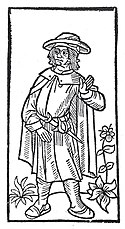Children of the Night (Robinson)
Children of the Night – tomik wierszy amerykańskiego poety Edwina Arlingtona Robinsona[1][2], opublikowany w 1897[3]. Był on drugim ogłoszonym przez tego autora zbiorem po The Torrent and the Night Before.
Forma
Tomik charakteryzuje się znacznym wyrafinowaniem formalnym[1][4]. Znajomość klasycznych form wersyfikacyjnych, zwłaszcza średniowiecznych francuskich układów stroficznych, poeta zawdzięczał Alansonowi Tuckerowi Schumannowi[5]. Zawiera między innymi wiersze napisane w formie ballady francuskiej[6][7][8], jak poniższa ballada o nieżyjących przyjaciołach. Kompozycja ballady francuskiej, zwanej również villonowską od nazwiska François Villona, twórcy Wielkiego testamentu opiera się na powtarzaniu tych samych rymów we wszystkich trzech strofach i przesłaniu (envoy):
- As we the withered ferns
- By the roadway lying,
- Time, the jester, spurns
- All our prayers and prying --
- All our tears and sighing,
- Sorrow, change, and woe --
- All our where-and-whying
- For friends that come and go.
- Life awakes and burns,
- Age and death defying,
- Till at last it learns
- All but Love is dying;
- Love's the trade we're plying,
- God has willed it so;
- Shrouds are what we're buying
- For friends that come and go.
- Man forever yearns
- For the thing that's flying.
- Everywhere he turns,
- Men to dust are drying, --
- Dust that wanders, eying
- (With eyes that hardly glow)
- New faces, dimly spying
- For friends that come and go.
- ENVOY
- And thus we all are nighing
- The truth we fear to know:
- Death will end our crying
- For friends that come and go.
W literaturze anglojęzycznej ballady francuskie pisali między innymi Geoffrey Chaucer i Algernon Charles Swinburne[9][10]. Robinson zamieścił w omawianym zbiorku również utwory realizujące model sonetu[11] i villanelli[12].
Przekłady
Niektóre utwory z omawianego tomu (John Evereldown, Luke Havergal, Richard Cory, Dear Friends i Aaron Stark) przełożyła na język polski Ludmiła Marjańska[13].
Przypisy
- ↑ a b Edwin Arlington Robinson, Poet (1869–1935). PoetryFoundation.org. [dostęp 2017-02-05]. (ang.).
- ↑ Edwin Arlington Robinson. poets.org. [dostęp 2017-02-05]. (ang.).
- ↑ Edwin Arlington Robinson, [w:] Encyclopædia Britannica [online] [dostęp 2017-02-05] (ang.).
- ↑ Robert D. Stevick: Formulation of E. A. Robinson's Principles of Poetry. digitalcommons.colby.edu, 1969. [dostęp 2017-02-05]. (ang.).
- ↑ Jeffrey Gray, Mary McAleer Balkun, James McCorkle (red.): American Poets and Poetry: From the Colonial Era to the Present, Vol. I. books.google.pl. s. 531. [dostęp 2017-02-05]. (ang.).
- ↑ Jacek Baluch, Piotr Gierowski: Czesko-polski słownik terminów literackich. Kraków: Wydawnictwo Uniwersytetu Jagiellońskiego, 2016, s. 58. ISBN 978-83-233-4066-9.
- ↑ Josef Brukner, Jiří Filip: Poetický slovník. Praha: Mladá fronta, 1997, s. 56-57. ISBN 80-204-0650-6.
- ↑ Wiktor Jarosław Darasz: Mały przewodnik po wierszu polskim. Kraków: Towarzystwo Miłośników Języka Polskiego, 2003, s. 164-165. ISBN 83-900829-6-9.
- ↑ John Strachan, Richard Terry: Poetry. books.google.pl, 2011. s. 203. [dostęp 2017-02-05]. (ang.).
- ↑ Algernon Charles Swinburne: A Ballad Of Burdens. PoemHunter. [dostęp 2017-02-05]. (ang.).
- ↑ Edwin Arlington Robinson (1869-1935): Sonnets from The Children of the Night (1897). sonnets.org. [dostęp 2017-02-05]. (ang.).
- ↑ Scott Donaldson: Edwin Arlington Robinson: A Poet's Life. books.google.pl, 2007. s. 54. [dostęp 2017-02-05]. (ang.).
- ↑ Edwin Arlington Robinson: Wiersze wybrane. Wybrała, przełożyła i wstępem opatrzyła Ludmiła Marjańska. Warszawa: Państwowy Instytut Wydawniczy, 1986. ISBN 83-06-01283-6.
Bibliografia
- Edwin Arlington Robinson: The Children of the Night. Archive.org, 1921. [dostęp 2017-02-05]. (ang.).
Linki zewnętrzne
- Edwin Arlington Robinson: The Children of the Night. ia902704.us.archive.org. [dostęp 2017-02-05]. (ang.).
- Edwin Arlington Robinson: Collected Poems. Bartleby.com. [dostęp 2017-02-05]. (ang.).
Media użyte na tej stronie
Edwin Arlington Robinson, poet
Reproduction of a photograph of English writer and poet Algernon Charles Swinburne (1837-1909)





